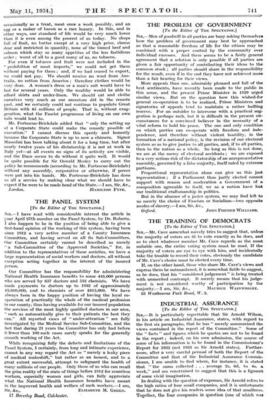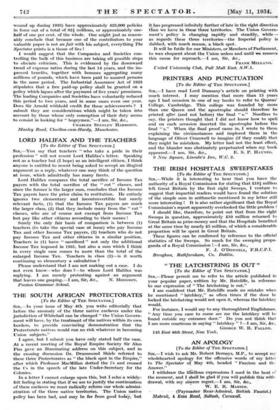INDUSTRIAL ASSURANCE
[To the Editor of THE SPECTATOR.] Sin,—It is particularly regrettable that Sir Arnold Wilson, in his article on Industrial Assurance, states, with regard to the first six paragraphs, that he has " merely summarized, the views contained in the report of the Committee." Some of the " facts " and figures which he quotes are not to be found in the report ; indeed, on his own admission, the source -of some of his information is to be found in the Commissioner's Report for 1932 (not 1933 as Sir Arnold states). Further- more, after a very careful perusal of both the Report of the Committee and that of the Industrial Assurance Commis- sioner, I am unable to find where, for instance, it is stated that " the sums collected . . . average 2s. 6d. to 4s. a week," and am constrained to suggest that this is a figment of some vivid imagination.
In dealing with the question of expenses, Sir Arnold refers to the high ratios of four small companies, and it is unfortunate that he does not give his readers some idea of that smallness. Together, the four companies in question (one of which was wound up during 1933) have approximately 423,000 policies in force out of a total of 821 millions, or approximately one- half of one per cent. of the whole. One might just as reason- ably conclude that because one of the contributors to your valuable paper is not au fait with his subject, everything The Spectator prints is a tissue of lies I
I would suggest that the Companies and Societies con- trolling the bulk of this business are taking all possible steps to obviate criticism. This is evidenced by the downward trend of expense ratios during the last 14 years, and the im- proved benefits, together with bonuses aggregating many millions of pounds, which have been paid to assured persons in the same period. The Industrial Assurance Act of 1923 stipulates that a free paid-up policy shall be granted on a policy which lapses after the payment of five years' premiums. The leading Companies and Societies have voluntarily reduced this period to two years, and in some cases even one year. Does Sir Arnold withhold credit for these achievements ? I submit they are considerations which might be taken into account by those whose only conception of their duty seems to consist in looking for " bogeymen."—I am, Sir, &c.,









































 Previous page
Previous page